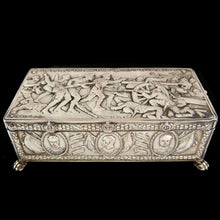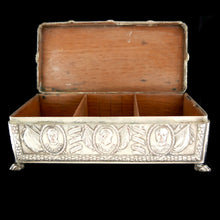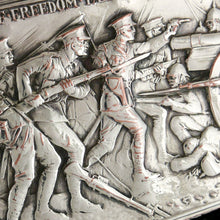A First World War Patriotic Box, circa 1914
Adding product to your cart
Length: 20cm (8in)
The lid cast in low relief with a depiction of British infantry by R. Caton-Woodville, and Kipling’s words ‘What stands if Freedom fall? Who dies if England live?’; the sides further embellished with portraits of Allied heads of state. Silver plate.
The collaboration between Rudyard Kipling (1865-1936) and the artist and illustrator Richard Caton-Woodville (1856-1927) extended back to 1899 when the former penned the poemThe Absent Minded Beggar as a fundraiser for the troops, and the latter created his iconic image A Gentleman in Kharki.
In 1914 Kipling, like many other writers, was an enthusiastic supporter of the war. In his writings he scorned those who shirked their duty and through his influence with his lifelong friend, Lord Roberts, obtained a commission for his son in the Irish Guards after rejection on the grounds of poor eyesight. Following the death of Kipling’s son at the Battle of Loos in September 1915, Kipling’s revised position on the war found expression in his work for the Imperial (now Commonwealth) War Graves Commission - his most significant contribution being his selection of the biblical phrase ‘Their Name Liveth For Evermore’ found on Stones of Remembrance, and his suggestion of the phrase ‘Known unto God’ for the gravestones of the unidentified. He was also responsible for the inscription ‘The Glorious Dead’ on the Cenotaph.










